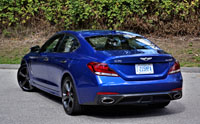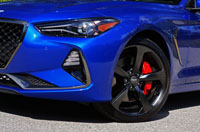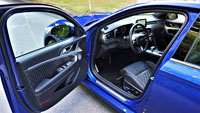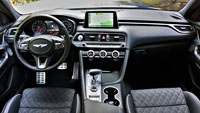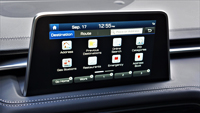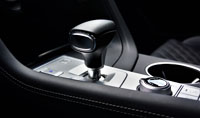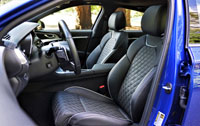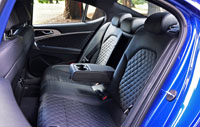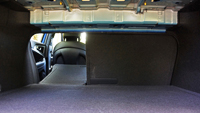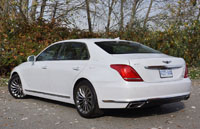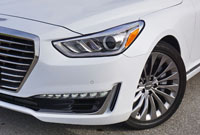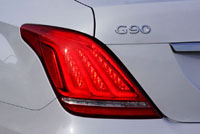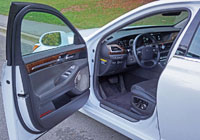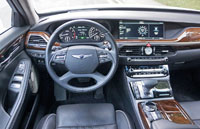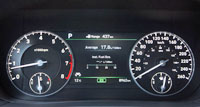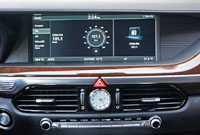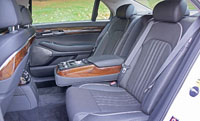
A perfect storm? Two issues are causing mayhem in the automotive sector this year, the first being a Canadian economy that started slowing last year, and the second more obvious problem being the current health crisis that has put so many out of work, resulting in plenty of 2019 model year vehicles still available more than halfway into 2020. Such is the case for the 2019 G80, which fortunately for you didn’t change much when moving into the newer model year.
In fact, the G80 didn’t change a heck of a lot from its previous Hyundai Genesis Sedan days, back in model years 2015 and 2016, to the four-door mid-size luxury sedan that came for the 2017 model year and the one we have now, other than some very minor styling tweaks and the addition of the mid-range turbocharged V6 being tested here. The new powerplant gives the G80 a three-engine lineup, which is exactly one for each of its three trims. Base Technology trim gets a naturally aspirated 3.8-litre V6 good for 311 horsepower and 293 lb-ft of torque, this Sport model receives a 3.3-litre twin-turbo V6 capable of 365 horsepower and 376 lb-ft of torque, and the top-line G80 Ultimate goes quickest thanks to a naturally aspirated 5.0-litre V8 that puts out 420 horsepower and 383 lb-ft of torque. All utilize an eight-speed automatic and each comes standard with all-wheel drive, so finding traction off the line is no problem at all.

Specs aside, the G80 is an excellent example of modern engineering done well, as are all Genesis models. It can easily keep up with its German, domestic and Japanese rivals, while it’s also attractive, impressively refined with nicely finished materials inside, filled with tech, convenience and luxury features, and wholly deserving of being slotted alongside the Mercedes E-Class/CLS-Class, BMW 5/6 Series, Audi A6/A7, Lexus GS, and other luxury-branded mid-size E-segment sedans. The only negatives worth interjecting include a lack of heritage, which was also true of entries from Lexus, Acura and Infiniti in their early days, and the model’s age. As it is, the G80 is well into six model years, which is a slightly lengthier stint than average in this class or any, but being that there aren’t too many on the road it still appears fairly fresh, plus it doesn’t hurt that its design was great looking from onset.
Model year 2021 will see an all-new G80, which looks fabulous thanks to an even more eye-catching version of the G90’s brilliant-cut diamond-shaped grille and plenty of styling cues from the intriguing new GV80 mid-size luxury crossover, so therefore mid-size luxury sedan buyers wanting to take advantage of any deals available on 2019 or 2020 models should act quickly.

The only changes from 2019 to 2020 was to the centre stack, the CD player being removed for some reason. It’s an odd update for a car that will only be around for one year, but it is what it is, and thus the newer model will be more appealing to those who consider CDs antiquated, and less so for those who still appreciate this format’s better sound quality (than mp3s).
This means the rest of the 2020 G80 is exactly the same as the outgoing 2019 model, which as noted is hardly a bad situation. Making either model better are factory leasing and financing rates from zero percent. You can find out all about it on our 2019 Genesis G80 Canada Prices page or our 2020 Genesis G80 Canada Prices page, and while you’re there check out our configuration tool that allows you to build either car out in detail. A CarCostCanada membership will provide you with leasing and financing deal information for other models as well, plus manufacturer incentives including rebates, and best of all, dealer invoice pricing that can save you thousands. Learn how it works now, and also enjoy the convenience of our free CarCostCanada app, downloadable from the Google Play Store or Apple Store.
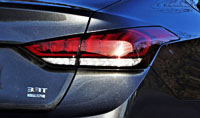
Google and Apple in mind, Android Auto and CarPlay smartphone integration comes with every 2019 and 2020 G80, that aforementioned Technology model starting at $58,000 and including LED DRLs and taillights, 18-inch alloys, proximity keyless access with a hands-free power-opening/closing trunk, genuine open-pore hardwood interior trim, a heatable steering wheel, power-adjustable tilt/telescopic steering, a 7.0-inch colour multi-info display/digital gauge package, a head-up display, a large 9.2-inch centre touchscreen, navigation, 17-speaker audio, an auto-dimming centre mirror, LED interior lighting, a big panoramic moonroof, a 16-way power-adjustable driver’s seat, a 12-way power-adjustable front passenger’s seat, Nappa leather upholstery, heated front and rear outboard seats, cooled front seats, and a bevy of advanced driver assistance systems including autonomous emergency braking with pedestrian detection, blind spot detection, lane departure warning, lane change assist, lane keep assist, rear cross-traffic alert, adaptive cruise control, and driver attention alert.
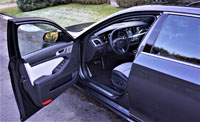
Both $62,000 Sport and $65,000 Ultimate trims replace the base model’s bi-xenon headlamps with full LEDs, while also adding 19-inch alloys, a microsuede headliner, and a credit card-style remote key fob, while exclusive to the Sport is a unique set of 16-way powered front Sport seats that were especially comfortable and wonderfully supportive to the lower back as well as under the knees, the former benefiting from four-way powered lumbar support adjustment, and the latter getting a power-extendable bottom cushion.
My tester featured a duo-tone light grey and charcoal black interior colour combo that was really nice looking, the two shades divided by stunning carbon-fibre glossy trim across the instrument panel and on the upper door sections, while a tasteful supply of brushed aluminum highlights added bling to key surfaces throughout the interior. Genesis even drilled out the aluminum Lexicon speaker grilles with a cool geometric design, while all of the various buttons, knobs and switches give the G80 a sense of occasion. There’s no shortage of soft-touch composites and leathers either, the Nappa leather seat upholstery particularly plush, resulting in a very refined, upscale environment.
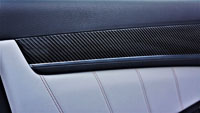
While it might be hard to find hard plastics in the new G80, it’s not exactly the most advanced when it comes to digital displays. It was certainly up to speed six or so years ago, but massive advancements in high-definition, fully digital gauge clusters and widescreen centre displays have made this otherwise beautiful cabin seem a bit dated compared to most rivals. The new 2021 G80 will take care of this problem, so tech fans may want to wait, but those who don’t care about the latest gadgets will likely be fine with the current model’s mostly analogue gauge package, which is highly visible in all lighting conditions, plenty colourful at centre, and fully functional, while the previously noted head-up display was wonderfully useful and plenty advanced.
The centre-mounted infotainment touchscreen is up to task too, providing an attractive graphical display for the superb Lexicon stereo noted before, not to mention the advanced parking camera with active guidelines, 360 degrees of overhead views, and various closeup angles. While the climate control system needs to be actuated via a separate interface below, when choosing a given setting, a simulated cabin graphic shows individual temperatures on the main screen, which is pretty cool.
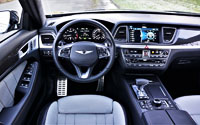
Amid the various knobs and buttons on the just-noted HVAC interface, an attractive square analogue clock provides a level of elegance that Genesis won’t be carrying over to the 2021 G80, unfortunately, while the CD changer in the similarly styled audio panel just below has already been deleted as mentioned earlier. Genesis provides USB and aux connectors in a lidded compartment below these as part of the lower console, right next to a wireless device charger that ideally tilts towards both front occupants.
An overhead console hovers above with handy felt-lined sunglasses storage, plus LED reading and dome lamps, powered panoramic sunroof controls, the glass of which can be shaded by pushing forward on a secondary switch. That shade is wrapped in a super soft microsuede, just like the roof liner, both sun visors, and each of the G80’s roof pillars.

The mid-size Genesis’ driving position is inherently good, and made even better thanks to those previously noted sport seats, while those in back get an equally spacious compartment. After setting the driver’s seat up for my long-legged, short-torso, five-foot-eight body, I had approximately eight inches ahead of my knees, plenty of legroom, about four inches from the door panel to my shoulders and hips, plus three or so inches of headroom left over, which means the majority of folks should fit in back with room to spare.
As yet unmentioned rear seat goodies include LED reading lights overhead, separate HVAC vents with separate controls housed on the back of the front console, and a pair of particularly well-made magazine pockets on backsides of the front seats, which incidentally are very nicely finished with leather (or at least it looked like leather) from top to bottom. The rear door panels are just as nicely made as those in front, by the way, while the flip-down centre armrest gets dual cupholders, as is almost always the case, plus an unusual set of three-way seat heater controls. A metal clothes hook can be found on the backside of each B-pillar too, which I find very helpful when wanting to arrive at an event without creases in my jacket.
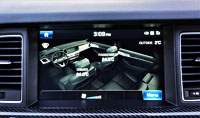
At 433 litres the G80’s trunk is quite sizeable too, but the back seats don’t fold down to accommodate longer cargo like most rivals. Still, you can stuff skis and the like into a centre pass-through, which almost makes up for the rear seats’ static status.
While the rear of the G80 is pretty well unchanged since inception, some trim details aside, the model received new headlights for 2018, plus a reworked lower front grille, slightly refreshed front and rear facias, new standard 18-inch alloys, new primary instruments, the gorgeous analogue clock and front speaker grilles mentioned before, and a new leather-wrapped, metal-clad shifter knob topping an even more impressive electronic eight-speed automatic transmission that replaced the older-tech mechanical eight-speed autobox.

A mere tap rearward puts it into Drive and equally light push forward engages Reverse, with the centre position reserved for neutral as one might expect. The unexpected was an electronic gearbox that’s as easy to slot into gear (or out of gear) as the old-school tranny was, which is not always the case for some (I’m talking to you, Chrysler 300). Like all electronic automatics you don’t need to select Park when shutting off the ignition, as pressing the dash-mounted Engine Start Stop button will do the same thing.
A drive mode selector can be found just aft of the shift lever, with Normal, Eco and Sport selections. Eco mode really retards throttle response, which went a long way to helping the hefty sedan achieve its as-tested Transport Canada fuel economy ratings of 13.8 L/100km city, 9.7 highway and 11.9 combined. The entry-level V6 achieves a 13.4, 9.6 and 11.7 rating respectively, whereas the V8 is thirstiest at a claimed 15.6 city, 10.4 highway and 13.2 combined.
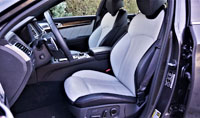
Sport mode makes a dramatic difference over the default Normal setting too, with even more satisfying results. The 3.3-litre twin-turbo’s 365 horsepower feels strong when pushed hard from takeoff, much due to each of the G80 Sport’s four 245/40R19 Continental all-season tires biting into pavement simultaneously via Genesis’ HTRAC all-wheel drive system, the car’s brilliantly quick sprints only improved upon by relentless highway passing performance.
The V6-powered G80 Sport benefits from a little less weight over the front wheels than the Ultimate with its Tau V8, which certainly benefits quickness through fast, tightly spaced curves. The G80 Sport manages these with ease, even with 2,120 kilograms pulling in the opposite directions, making the big sedan feel lighter and more agile than it should. Then again, the G80 provides one of the nicer rides in its class too, Genesis managing to be a best-of-both-worlds alternative to its European peers when it comes to quickly riding in comfort.
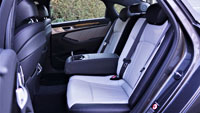
While most of the G80’s rivals offer more advanced features, especially in the tech department, Genesis’s mid-size offering will probably be more reliable over the long haul. Even better, it’s backed up by a five-year or 100,000-km warranty if something goes awry, covering almost every component that comes with the car. Scheduled maintenance is complimentary too, while your car will be picked up by their valet service at your home or office, saving you time and therefore money. If the G80 didn’t already have you sold at hello, some of these latter factors combine to make any new Genesis a very practical luxury choice, and worthy of your consideration.
Story and photo credits: Trevor Hofmann
Photo editing: Karen Tuggay


